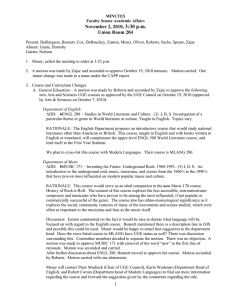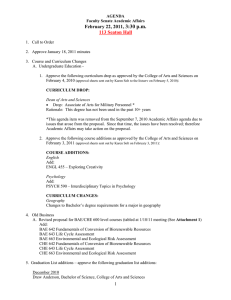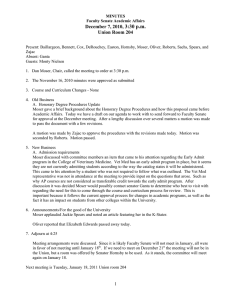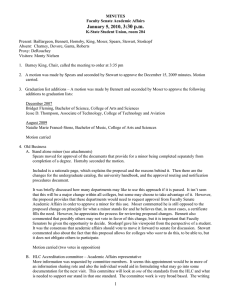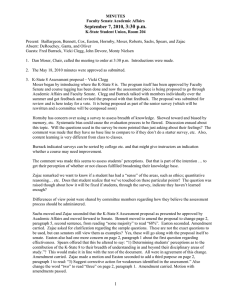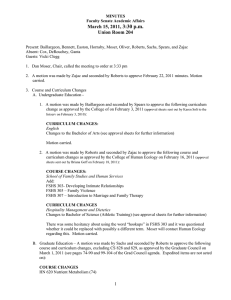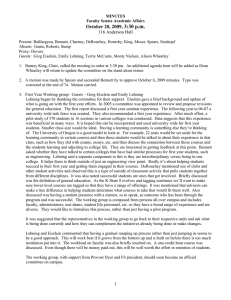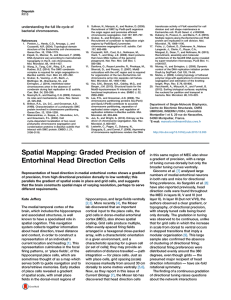3:30 p.m. February 22, 2011, 113 Seaton Hall
advertisement
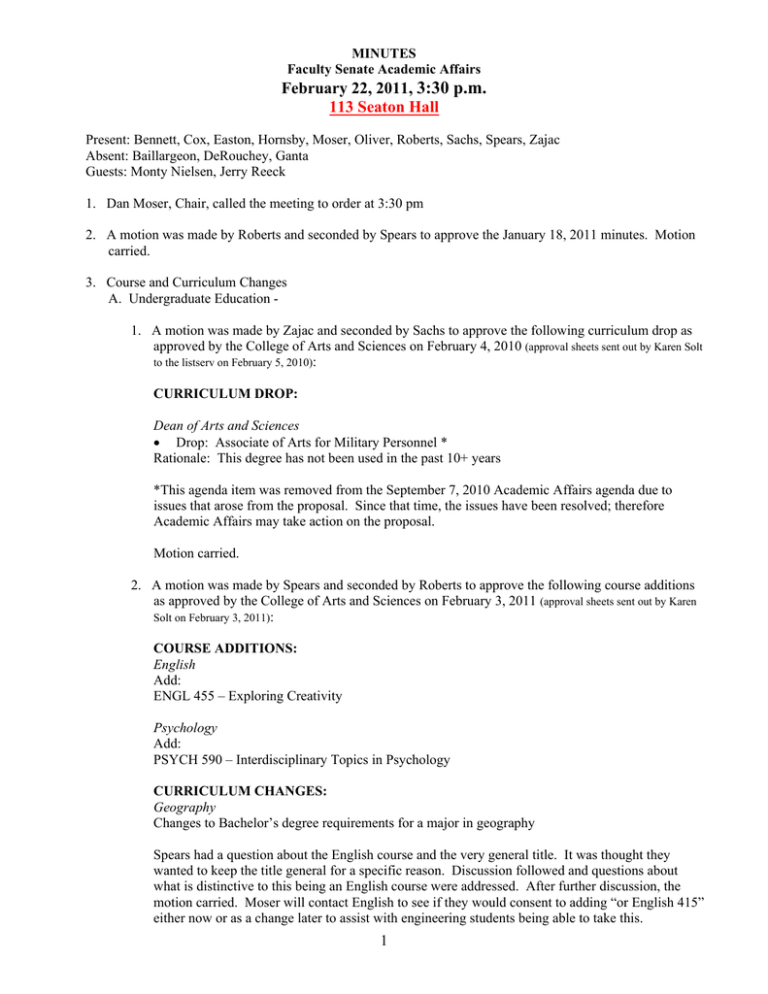
MINUTES Faculty Senate Academic Affairs February 22, 2011, 3:30 p.m. 113 Seaton Hall Present: Bennett, Cox, Easton, Hornsby, Moser, Oliver, Roberts, Sachs, Spears, Zajac Absent: Baillargeon, DeRouchey, Ganta Guests: Monty Nielsen, Jerry Reeck 1. Dan Moser, Chair, called the meeting to order at 3:30 pm 2. A motion was made by Roberts and seconded by Spears to approve the January 18, 2011 minutes. Motion carried. 3. Course and Curriculum Changes A. Undergraduate Education 1. A motion was made by Zajac and seconded by Sachs to approve the following curriculum drop as approved by the College of Arts and Sciences on February 4, 2010 (approval sheets sent out by Karen Solt to the listserv on February 5, 2010): CURRICULUM DROP: Dean of Arts and Sciences • Drop: Associate of Arts for Military Personnel * Rationale: This degree has not been used in the past 10+ years *This agenda item was removed from the September 7, 2010 Academic Affairs agenda due to issues that arose from the proposal. Since that time, the issues have been resolved; therefore Academic Affairs may take action on the proposal. Motion carried. 2. A motion was made by Spears and seconded by Roberts to approve the following course additions as approved by the College of Arts and Sciences on February 3, 2011 (approval sheets sent out by Karen Solt on February 3, 2011): COURSE ADDITIONS: English Add: ENGL 455 – Exploring Creativity Psychology Add: PSYCH 590 – Interdisciplinary Topics in Psychology CURRICULUM CHANGES: Geography Changes to Bachelor’s degree requirements for a major in geography Spears had a question about the English course and the very general title. It was thought they wanted to keep the title general for a specific reason. Discussion followed and questions about what is distinctive to this being an English course were addressed. After further discussion, the motion carried. Moser will contact English to see if they would consent to adding “or English 415” either now or as a change later to assist with engineering students being able to take this. 1 4. Old Business A. These courses were approved by Engineering on November 4 and Graduate School on December 7, 2010. However, they were tabled by FS Academic Affairs on January 18, 2011 due to concern about the prerequisite being graduate standing only. The department was contacted and sent forward a revision to the prerequisites for the courses. The committee reviewed the revised proposals and found them acceptable. A motion was made by Easton and seconded by Roberts to approve the revised proposals for the BAE/CHE courses. Motion carried (See Attachment 1). Add: BAE 642 Fundamentals of Conversion of Biorenewable Resources BAE 643 Life Cycle Assessment BAE 663 Environmental and Ecological Risk Assessment CHE 642 Fundamentals of Conversion of Biorenewable Resources CHE 643 Life Cycle Assessment CHE 663 Environmental and Ecological Risk Assessment 5. Graduation List additions – A motion was made by Bennett and seconded by Cox to approve the following graduation list additions: December 2010 Drew Anderson, Bachelor of Science, College of Arts and Sciences Rachel Doull, Bachelor of Science, College of Arts and Sciences Jamie Renee Klover, Bachelor of Science in Family Studies and Human Services, College of Human Ecology Izumi Yoshikawa, Bachelor of Arts, College of Arts and Sciences Reeck gave a brief background on Izumi Yoshikawa. Motion carried. 6. New Business A. BOR change from 124 to 120 credit hours required for graduation – submission of multiple changes. Moser discussed that most likely many departments will soon be changing their total number of required hours for graduation due to a change at the Board of Regents level. Would the committee be agreeable to receiving a reduced amount of paperwork on these specific changes? For example: not outlining the entire curriculum in the proposal sheets when they are only changing a small portion of it; such as reducing elective hours in a certain part. It was suggested that each department within a college submit the changes at the same time. Not that every college will make the change at the same time, but perhaps a college could submit their departments’ changes all at once, instead of a couple at a time. Committee members were in agreement with this. However, if a college will be making multiple types of changes to degree programs to reduce hours to 120, those would need to follow the normal process as outlined in the Approval, Routing, and Notifications instructions. B. Procedures for contacting a department about a course or curriculum change that impacts them. Moser reported that at their last Executive Committee meeting a senator requested this to be reviewed to make sure the right person is being contacted regarding impacts. Currently, proposed changes that impact other departments should receive a response in writing from those units’ department heads or chairs. How far should this go if you email a couple times and still don’t receive a response? It was determined if a good faith effort was made to contact a unit and there is documentation, the committee felt this should be sufficient and that a proposal from a college should not be penalized or held up due to this. For the future, a good example is continuing education and their approval sign off process. For right now, committee members felt the process is still appropriate. C. Academic Affairs chair for 2011-2012 Moser announced he will not be serving on the Academic Affairs committee next year; therefore a new chair will need elected for 2011-2012. This will take place near the end of April or first May meeting. 2 He encouraged continuing members to be thinking about this opportunity. He also commented how much he has thoroughly enjoyed his time on Leadership and serving as chair of Academic Affairs. 7. Announcements/for the good of the University • Moser announced that at the last senate meeting President Cauble made an incorrect statement KState 8. Vicki Clegg was consulted and it was clarified that you could still possibly take four courses to reach the total of 8 areas. Zajac wondered how K-State 8 impacts associates programs. • Moser discussed fire codes and classroom size. There was a concern recently about downsizing classes due to these codes. However, it appears this will not impact us at this time. • An ad hoc committee of eight members has been convened to discuss the Academic Calendar for year 2013 in that grades would be due on December 24. The committee will work on a recommendation and submit it first to the calendar committee and proceed from there. • Moser reported that “Zeitoun” is the new book for the K-State Book Network. He read it all the way through already and thoroughly enjoyed it. 8. Meeting adjourned at 4:20 p.m. Next meeting is Tuesday, March 15, 2011, Union Room 204 3
